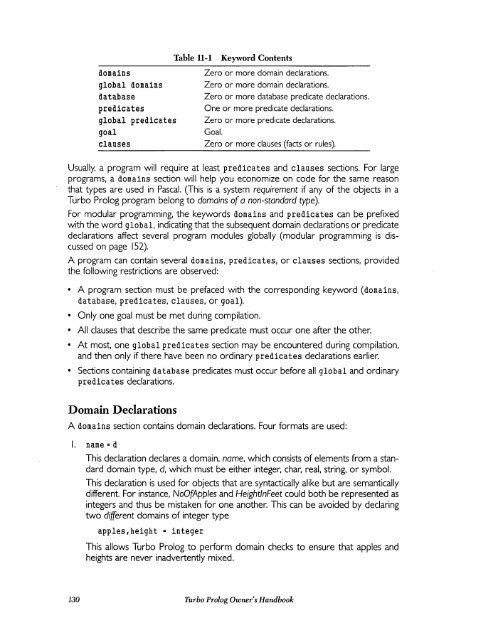Turbo Prolog
Turbo Prolog
Turbo Prolog
You also want an ePaper? Increase the reach of your titles
YUMPU automatically turns print PDFs into web optimized ePapers that Google loves.
domains<br />
global domains<br />
database<br />
predicates<br />
global predicates<br />
goal<br />
clauses<br />
Table 11-1 Keyword Contents<br />
Zero or more domain declarations.<br />
Zero or more domain declarations.<br />
Zero or more database predicate declarations.<br />
One or more predicate declarations.<br />
Zero or more predicate declarations.<br />
Goal.<br />
Zero or more clauses (facts or rules).<br />
Usually, a program will require at least predicates and clauses sections. For large<br />
programs, a domains section will help you economize on code for the same reason<br />
that types are used in Pascal. (This is a system requirement if any of the objects in a<br />
<strong>Turbo</strong> <strong>Prolog</strong> program belong to domains of a non-standard type).<br />
For modular programming, the keywords domains and predicates can be prefixed<br />
with the word global, indicating that the subsequent domain declarations or predicate<br />
declarations affect several program modules globally (modular programming is discussed<br />
on page 152).<br />
A program can contain several domains, predicates, or clauses sections, provided<br />
the following restrictions are observed:<br />
• A program section must be prefaced with the corresponding keyword (domains,<br />
database, predicates, clauses, or goal).<br />
• Only one goal must be met during compilation.<br />
• All clauses that describe the same predicate must occur one after the other.<br />
• At most, one global predicates section may be encountered during compilation,<br />
and then only if there have been no ordinary predicates declarations earlier.<br />
• Sections containing database predicates must occur before all global and ordinary<br />
predicates declarations.<br />
Domain Declarations<br />
A domains section contains domain declarations. Four formats are used:<br />
I. name = d<br />
130<br />
This declaration declares a domain, name, which consists of elements from a standard<br />
domain type, d, which must be either integer, char, real, string, or symbol.<br />
This declaration is used for objects that are syntactically alike but are semantically<br />
different. For instance, NoOfApples and HeightlnFeet could both be represented as<br />
integers and thus be mistaken for one another. This can be avoided by declaring<br />
two different domains of integer type<br />
apples,height = integer<br />
This allows <strong>Turbo</strong> <strong>Prolog</strong> to perform domain checks to ensure that apples and<br />
heights are never inadvertently mixed.<br />
<strong>Turbo</strong> <strong>Prolog</strong> Owner's Handbook


